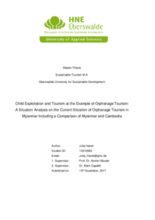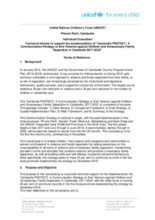This country page features an interactive, icon-based data dashboard providing a national-level overview of the status of children’s care and care reform efforts (a “Country Care Snapshot”), along with a list of resources and organizations in the country.
demographic_data
childrens_living_arrangement
children_living_without_bio
social_work_force
key_stakeholders
Key Stakeholders
Add New DataOther Relevant Reforms
Add New Datadrivers_of_institutionalisation
Drivers of Institutionaliziation
Add New Datakey_research_and_information
Key Data Sources
Add New DataMapping of residential care facilities in the capital and 24 provinces of the kingdom of Cambodia
National estimation of children in residential care institutions in Cambodia: A modelling study
Prevalence and number of children living in institutional care: global, regional, and country estimates
Shaping the national social protection strategy in Cambodia: Global influence and national ownership
Towards a Social Protection Strategy for the Poor and Vulnerable: Outcomes of the consultation process
Country Care Profile: Cambodia
Acknowledgements
Data for this country care snapshot was contributed by partners at Family Care First and UNICEF Cambodia.
Displaying 141 - 150 of 285
This opinion piece from Inquire explains how voluntourism in orphanages does more harm than good.
This thesis focused on the two questions ‘What is the current situation on orphanage tourism in Myanmar?’ and ‘What are the causes of orphanage tourism?’.
This article from the Phnom Penh Post discusses recent government reforms of orphanages in Cambodia in response to the rising incidence of families sending children to these institutions for educational opportunities that are not available in some communities.
UNICEF is recruiting for a Consultant to serve as the Technical Adviser to support the implementation of “Cambodia PROTECT: A Communication Strategy to End Violence against Children and Unnecessary Family Separation in Cambodia 2017-2022”.
This week the Cambodian government released an explanatory note to educate the public on domestic adoption; however, some express concern whether bolstering domestic adoptions is currently feasible or safe for children.
This article describes a 60 Minutes interview with Tara Winkler, co-founder of Cambodian Children's Trust, about the exploitation of children in orphanages, the harm caused by orphanage tourism, and Australia's potential ban on orphanage tourism.
Despite good intentions, volunteers and donors from Australia and the larger international community are supporting orphanages separating children from their families. Australia is seeking to curb support for orphanages in countries like Cambodia, where the trafficking of children into orphanages is a common practice.
CRS is recruiting for a 4Children Cambodia Project Director to be based in Phnom Penh, Cambodia.
In this audio clip, Andrea Nave, Tara Winkler and Sinet Chan give evidence to the Australian Modern Slavery inquiry on orphanage tourism and trafficking of children into orphanages.
Cambodia's Battambang province will be the first to implement the country's new deinstitutionalization policy.


